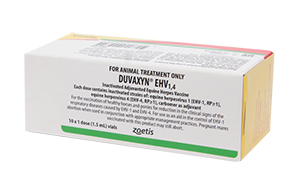Duvaxyn® EHV 1,4
Description
Inactivated herpes virus vaccine for use in horses.
Recommendations for Use
- For the vaccination of healthy horses and ponies for reduction in the clinical signs of the respiratory diseases caused by EHV-1 and EHV-4
- For use as an aid in the control of EHV-1 abortion when used in conjunction with appropriate management practices. Pregnant mares vaccinated with this product may still abort
- The vaccine is recommended for use in healthy horses and ponies from five months of age
Pack Sizes
10 x 1 mL dose vials.
- Important contribution to an effective management program of both respiratory disease and abortion in horses.
- Vaccination against both herpes viruses and strangles may reduce the impact of respiratory disease in competition horses and on horse farms
Clinical Use
Vaccination Against Respiratory Disease
- Primary course: A single dose of Duvaxyn EHV1,4 should be administered from five months of age followed by a second injection after an interval of 4-6 weeks. In the event of increased infection risk, for example when a foal has consumed insufficient colostrum or there is risk of early exposure to field infections with EHV-1 or EHV-4, an earlier vaccination may be given. In these circumstances the foal should receive a single dose of Duvaxyn EHV1,4 from three months of age followed by the above mentioned full primary vaccination course.
- Boosting immunity: Following completion of the primary course, a single dose of Duvaxyn EHV1,4 should be administered every six months.
Vaccination to Aid in the Control of Abortion
- For use as an aid in the control of EHV-1 abortion when used in conjunction with appropriate management practices. Pregnant mares that have been previously primed should be vaccinated during the 5th, 7th and 9th months of pregnancy with a single dose on each occasion. Pregnant mares vaccinated with this product may still abort.
Human Safety
Additional user safety
Take care to avoid accidental self-injection. Accidental self-administration may result in local bruising, pain and swelling. In the event of self- administration, seek medical attention and show the package leaflet or the label, to the Medical Practitioner.
WARNINGS: Duvaxyn EHV1,4 is not intended for use in humans. Epizootics of herpes virus are most commonly associated with management practices that bring large numbers of horses together in close proximity, under conditions which product stress, i.e. weaning, transport and intermingling of horses originating from diverse locations.
First Aid Statement
If poisoning occurs, contact a doctor or Poisons Information Centre. Phone Australia 131126.
Registered label warnings
Withholding Periods
Zero (0) days
ESI
ESI not applicable
Contraindications
Do not vaccinate sick horses and ponies.
Side Effects
After administration of any vaccine, a systemic reaction can occasionally occur. Local reactions may occur following vaccination and are usually transient. In cases of local reaction, swellings usually measure not more than 5 cm diameter and disappear within 7 days post vaccination.
In the event of an allergic or anaphylactic reaction, immediate treatment should be given with a soluble glucocorticoid intravenously (eg dexamethasone sodium phosphate) or antihistamine intramuscularly.
Precautions
Animals that have received immunosuppressive drugs (eg glucocorticoids) should not be vaccinated until an interval of at least 4 weeks has elapsed.
The vaccine is safe for administration to pregnant mares but the handling of mares during pregnancy carries its own inherent risks.
Additional Information
Do not use chemicals to disinfect or sterilise the skin.
Vaccine which has been frozen is not suitable for use.
The vaccine may not be effective in animals incubating the disease at the time of vaccination.
In any animal population there will be a small number of individuals which fail to respond fully to vaccination. Successful vaccination depends upon correct storage and administration of the vaccine and the animal’s ability to respond. Immune competence can be influenced by genetic factors, intercurrent infection, age, nutritional status, concurrent drug therapy and stress.




 A Better Way To Buy
A Better Way To Buy